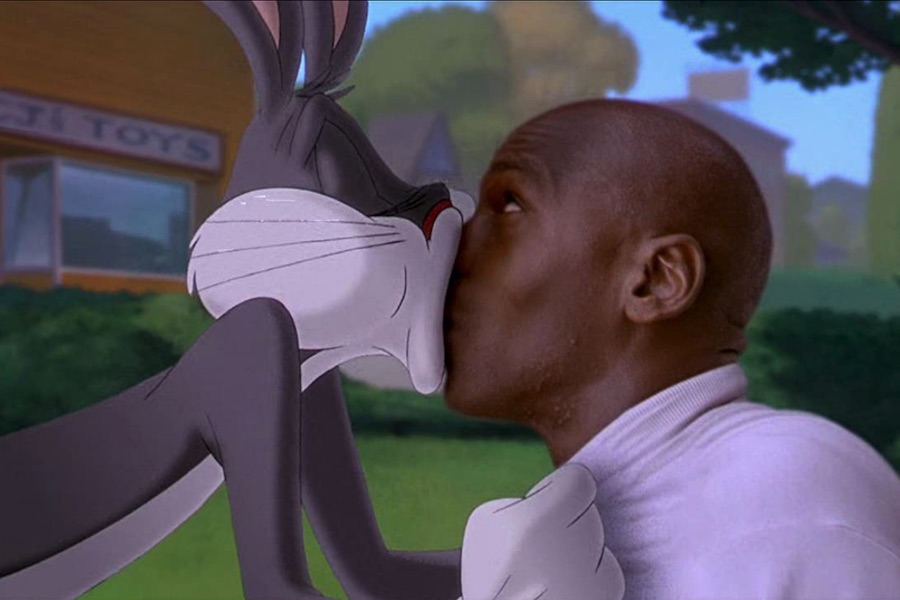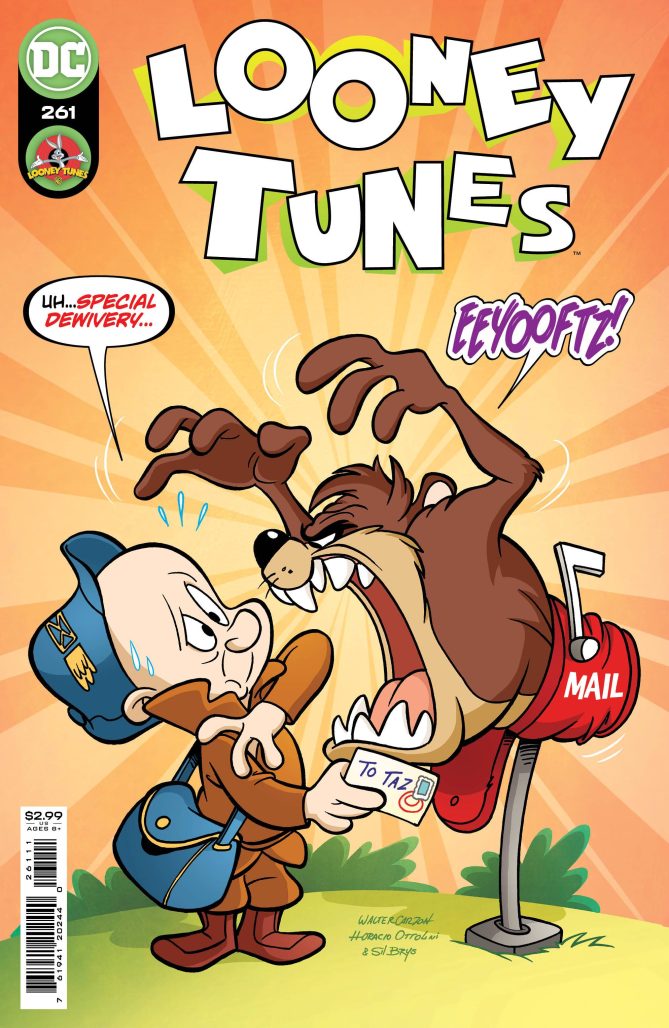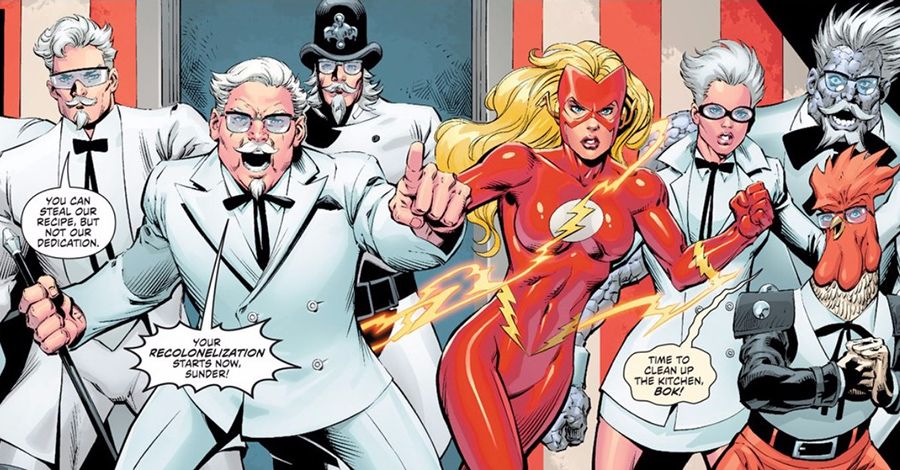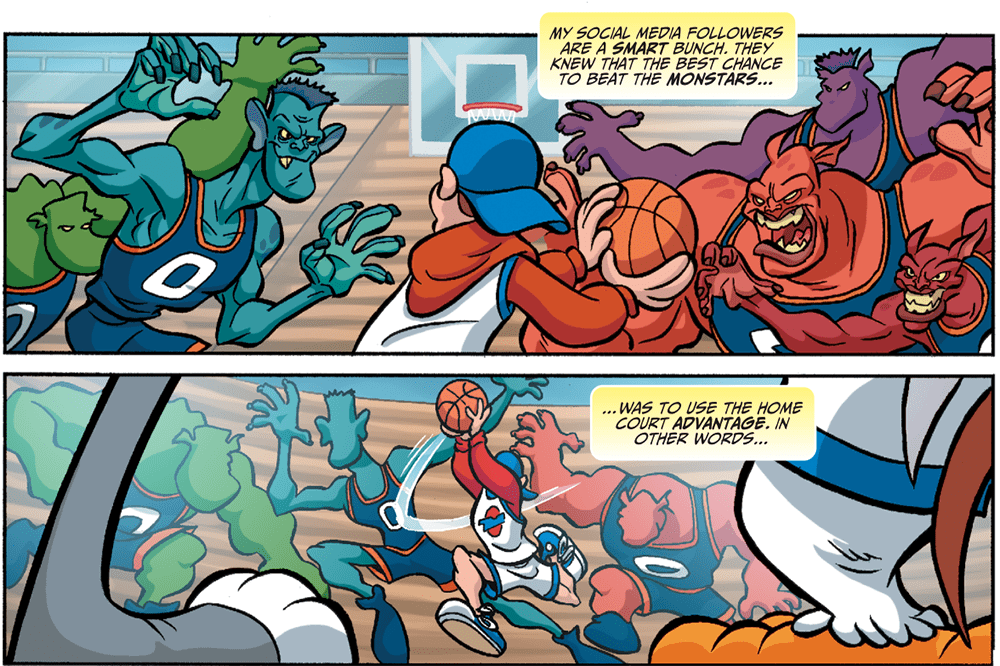The Beat's Gregory Paul Silber has been accused of having a bit of an… obsessive personality. Each week in Silber Linings, he takes a humorous look at the weirdest, funniest, and most obscure bits of comics and pop culture that he can't get out of his head.
November 15th, 2021 marked the 25th anniversary of the original Space Jam. In a press release from Warner Brothers this past Monday, the studio announced a slew of commemorative Space Jam products, including Space Jam rugs, Space Jam apparel from DJ Steve Aoki's streetwear brand, a vinyl reissue of the film's soundtrack, and, (sigh) Space Jam NFTs.

Naturally, I'm most interested in DC's digital-first Space Jam 25th Anniversary comic. You can read the free PDF right now from the "Stellar Souvenirs" section of the official Space Jam website, which wildly, as the press release acknowledges, remains virtually the same as it was back in 1996. The 12-page one-shot is written by Ivan Cohen, penciled by Robert Pope, inked by Scott McRae, colored by Carrie Strachan, and lettered by Wes Abbott.
Before we dive into the comic, let's talk about the movie it's commemorating. Despite never following basketball, I was an easy mark for Space Jam upon its initial release. As a 5-year-old in 1996, the Michael Jordan hype I absorbed through cultural osmosis made him seem like a real-life superhero. They called him "Air Jordan!" He could practically fly! Plus I liked Looney Tunes, like most kids who have been alive since the 1930s. I was pumped to see MJ team up with the likes of Bugs Bunny, Daffy Duck, and Porky Pig to save the world from evil aliens with the power of basketball, and saw it in theaters with my family.
While Space Jam received middling contemporaneous reviews, it was a box office smash, the #10 movie for the 1996 global box office. In this week's press release, Josh Hackbarth, vice president of franchise development for WarnerMedia Global Brands and Experiences, described Space Jam as "the iconic film moment of 1996." I'm... skeptical about that claim. Independence Day was the #1 film that year, and is arguably more iconic. I suppose one could argue Space Jam remains most iconic due to the way it's lived on through memes and public discourse, but 1996 was the year that also gave us Jerry Maguire, Scream, the original Mission: Impossible, and Warner Bros.' own Twister. All this stuff is subjective, but I suppose "iconic," "enduring," and "good" are very different qualifiers.

Hot.
In any event, I've found that people around my age have a weird relationship with Space Jam. It's certainly a film we remember watching and enjoying as kids, but I've been in the room for some heated disagreements over whether it's actually a good movie. That some people earnestly love and are nostalgic for Space Jam is pretty odd to me. I rewatched it this summer for the first time in many years in anticipation of the 2021 sequel Space Jam: A New Legacy, and while those hybrid live-action/animation special effects hold up, the script is a mess. It's entertaining in its way, but it's hard to shake the cash-grabbiness of it all.
Of course, that doesn't begin to compare to the soullessness and cynicism of Space Jam: A New Legacy. As other critics have said, it's an ugly, painfully unfunny corporate circle-jerk of a film that's less interested in basketball, Looney Tunes, and entertainment than flexing Warner Brothers' vast IP library.

I still have a sour taste in my mouth from watching Space Jam 2 on HBO Max over the summer, so I went into this 25th anniversary comic more than a little skeptical. Luckily, low bar as it may be, this little digital offering is a far superior Space Jam product.
DC's Looney Tunes title has been in continuous publication for decades (#264 comes out this January), and from what I've heard, they've been shockingly consistent the entire time. For the most part, Space Jam 25th Anniversary maintains the quality that's always made DC's Looney Tunes comics work, in that all the Tunes look and sound recognizable from their iconic cartoon source material.

'Looney Tunes' #261, released July 2021
I should also note that ever since I started following DC comics consistently at the dawn of The New 52, their free, digital-first comics have been better than they have any right to be. This is especially true of comics that were literally just advertisements, like some genuinely hilarious KFC comics (Colonel Sunder, the evil Colonel Sanders of Earth 3, is evil because he makes chicken "the easy way" and it's bad), and a 2012 Justice League story written by a fresh-faced Joshua Williamson in which the day is saved by a new superhero named The Technician, a master of the Craftsman Bolt-On System . These comics were easily more entertaining than the majority of DC's output in the early 2010s, and while that's extremely funny, I'm not joking in the least.
. These comics were easily more entertaining than the majority of DC's output in the early 2010s, and while that's extremely funny, I'm not joking in the least.

Into the Sanders-Verse
The key to what makes comics like those work is that they're deeply tongue-in-cheek. They're clearly written by people who think it's absolutely hilarious that they're getting paid to tell a story made for the express purpose of selling fried chicken or home improvement tools, and also Green Lantern is there. I'd read something that makes me laugh any day over, I don't know, the Suicide Squad getting tortured, or literally any Scott Lobdell-written comic.
Space Jam 25th Anniversary isn't what I'd call tongue-in-cheek, or even necessarily good, but at least it's self-aware. What I actually appreciate most is that it's refreshingly unambitious. There are no cameos from other Warner Bros IPs like The Matrix or Game of Thrones or even DC superheroes. There aren't even any real-life basketball stars, with no mention of Michael Jordan or Lebron James. It's basically just a short rematch against the Mon-Stars, the extraterrestrial villains of the original Space Jam (led by the voice of Danny DeVito) who stole the talents of 1996's greatest basketball stars in a convoluted ploy to conquer Earth.

From the 'Space Jam 25th Anniversary' comic
There is a human character at the center of the 25th anniversary comic, though. He's an intern at ACME (which sounds like an exceedingly dangerous job), and we never see his face. It quickly becomes apparent why: he's the reader-identification character. If we knew exactly what he looked like, it would be harder for us to imagine ourselves in his shoes and oversized ACME hoodie.
It's not exactly high-concept, but it does read like a direct reaction against the overblown scale of A New Legacy. The fantasy of Space Jam isn't necessarily the sci-fi stuff or the basketball stars, but being a kid and imagining yourself hanging out with your favorite cartoon characters as you play an otherwise mundane game like basketball.







 . These comics were easily more entertaining than the majority of DC's output in the early 2010s, and while that's extremely funny, I'm not joking in the least.
. These comics were easily more entertaining than the majority of DC's output in the early 2010s, and while that's extremely funny, I'm not joking in the least.

No comments:
Post a Comment